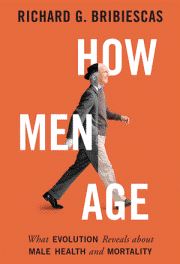How Men Age: What evolution reveals about male health and mortality
 Richard G Bribiescas
Richard G Bribiescas
Princeton University Press,
£18.95
Why are men typically outlived by their wives? Why do men remain fertile for longer than women? These are some of the questions that How Men Age seeks to answer by looking at the biological and social forces that have shaped male ageing.
The book offers an interesting perspective in focusing on the ageing process of one sex. Being written by a biological anthropologist, it also offers plenty of anecdotes of male life and ageing in other cultures.
The field of biogerontology has undergone a renaissance over the past two decades as scientists have explored the molecular biology of how we age. Although Richard Bribiescas briefly reviews the traditional theories of why organisms age (antagonistic pleiotropy, somatic maintenance and oxidative damage), the author is biased towards these and makes little mention of more recent work showing that the ageing process is more complex than anyone would have thought.
The overall thesis of the book is sound, but the argument frequently conflates correlation with causation and the text is marred by the odd inaccuracy. For people willing to overlook these shortcomings, the book offers an interesting commentary on how male ageing has influenced the evolution of the human species.
Josephine Hellberg MRSB


